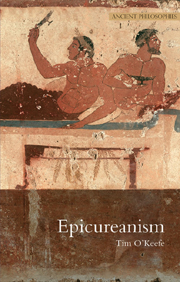Book contents
- Frontmatter
- Contents
- Preface
- Acknowledgements
- Sources and abbreviations
- Chronology
- 1 Introduction: the life of Epicurus and the history of Epicureanism
- I Metaphysics and physics: introduction and overview
- 2 Atoms and void
- 3 Atomic motion
- 4 Sensible qualities
- 5 Cosmology
- 6 Biology and language
- 7 The mind
- 8 Freedom and determinism
- II Epistemology: introduction and overview
- III Ethics: introduction and overview
- Glossary of terms
- Notes
- Further reading
- Bibliography
- Index
5 - Cosmology
from I - Metaphysics and physics: introduction and overview
- Frontmatter
- Contents
- Preface
- Acknowledgements
- Sources and abbreviations
- Chronology
- 1 Introduction: the life of Epicurus and the history of Epicureanism
- I Metaphysics and physics: introduction and overview
- 2 Atoms and void
- 3 Atomic motion
- 4 Sensible qualities
- 5 Cosmology
- 6 Biology and language
- 7 The mind
- 8 Freedom and determinism
- II Epistemology: introduction and overview
- III Ethics: introduction and overview
- Glossary of terms
- Notes
- Further reading
- Bibliography
- Index
Summary
The Epicureans try to account for the formation of the earth and of the other heavenly bodies in terms of atoms blindly colliding in the void. Against most other cosmologists, they maintain that our world is only one of an infinite number of worlds, coming to be and falling apart in a spatially infinite universe that has existed and will exist forever. For the Epicureans, however, the most important feature of their cosmology is not that the universe is infinite; it is that it is purposeless. Explanations of the formation of the world and of phenomena such as earthquakes and lightning in terms of the interactions of atoms are supposed to displace retrograde and superstitious explanations that appeal to the gods. Not only that: the Epicureans are among the first philosophers to raise the problem of evil in order to argue that the world is not under the control of beneficent gods, as it is too flawed.
The infinite universe
The cosmos is our particular ordered world-system: the earth, sun, moon, planets, and stars. Leaving aside the stars – which are thought by the ancient Greeks to be in approximately the same area as the other celestial bodies – the cosmos is thus something like the solar system. But there is a sharp divide in antiquity between “two pictures of the world”.
Information
- Type
- Chapter
- Information
- Epicureanism , pp. 41 - 50Publisher: Acumen PublishingPrint publication year: 2009
